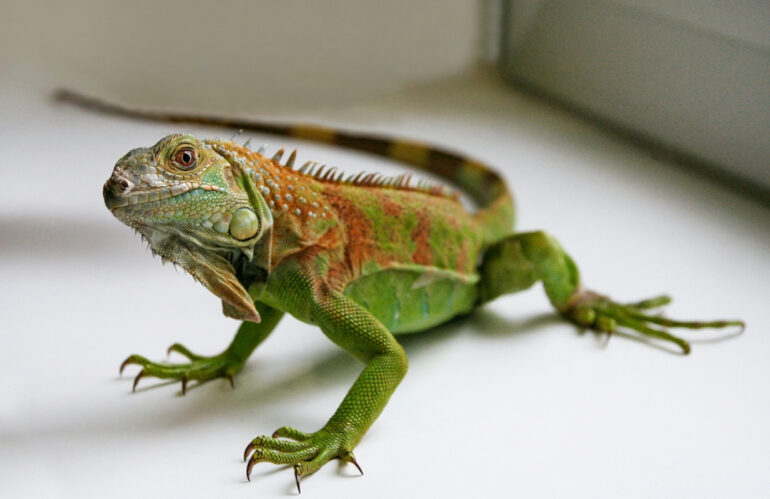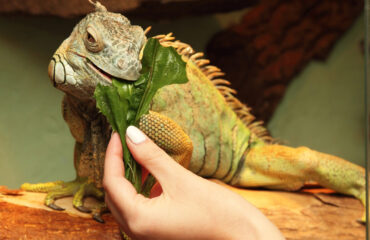Iguanas are exotic reptiles that can be amazing pets, but they require special care to be healthy and happy. If you have an iguana or are thinking of adopting one, you should learn about their environmental, dietary, and behavioral needs. In this blogpost, we will give you 10 tips to care for your iguana properly, based on our experience of more than 30 years in raising reptiles. We will also invite you to visit our online portal where you can buy healthy and beautiful iguanas, geckos, bearded dragons, and turtles at affordable prices.
- Choose a large and suitable terrarium for your iguana.
Iguanas can grow up to two meters long, so they need a spacious and comfortable space to move and explore. The terrarium should be at least 8 feet by 3 feet by 6 feet (2.4 meters by .9 meters by 1.8 meters), but the bigger the better. The terrarium should be made of a resistant and easy to clean material, such as metal or glass. - Create a proper climate for your iguana.
Iguanas are animals that need a warm and humid environment to thrive. They need a lot of light, especially ultraviolet light that is in the UVB spectrum. Without this type of light, your iguana could suffer from a deficiency of vitamin D, be unable to absorb calcium, and have other health problems. You should buy UVB light bulbs that are specifically labeled for reptiles and place them 12 to 18 inches (30 to 46 cm) above the iguana’s basking area.
You should also install a heat source for your iguana, as most climates are cooler than the environments where iguanas live. The coolest area of your iguana’s habitat should be between 75 and 80 degrees Fahrenheit (24 to 27 degrees Celsius). The basking area should be between 95 and 100 degrees Fahrenheit (35 to 38 degrees Celsius). You can use a heat lamp, a heat rock, or a ceramic heater to provide heat.
You should also monitor the temperature and humidity levels in the habitat with thermostats and hygrometers. The ideal humidity level for your iguana is around 70%. You can increase the humidity by adding a pool of water to the enclosure or using a mister. You should mist your iguana twice a day to increase humidity and maintain healthy skin. - Provide your iguana with a basking area.
The basking area is an area of your iguana’s habitat where your iguana can enjoy heat and light. This area is essential for making your iguana happy and healthy. Without a basking area, your cage won’t simulate the iguana’s natural environment. The basking area should have:
– A large flat area for your iguana to lay.
– Direct light from a UVB light bulb.
– A close proximity to a heat source. - Outfit the habitat with hiding places and climbing structures.
Iguanas are arboreal animals that like to climb and hide in trees. You should provide your iguana with branches, shelves, ramps, and plants that it can use to climb and rest on different levels of the habitat. You should also provide your iguana with hiding places, such as boxes, caves, or hollow logs, where it can feel safe and secure.
Make sure any branches or structures you place in the habitat are large and strong enough to support the iguana’s weight. Also make sure they are not too close to the heat or light sources, as they could cause burns or overheating. - Feed your iguana a balanced and varied diet.
Iguanas are herbivorous animals that need a diet mainly composed of fresh vegetables, fruits, and greens. They need calcium and vitamin D3 supplements to prevent metabolic bone disease and ensure healthy egg development in females. You should feed your iguana daily and offer it a variety of foods.
Some of the best foods for your iguana are leafy greens, such as collard greens, mustard greens, dandelion greens, turnip greens, kale, and different types of lettuce. You can also offer your iguana other vegetables, such as carrots, squash, zucchini, bell peppers, and broccoli. You can also give your iguana some fruits, such as bananas, apples, grapes, strawberries, and melons. However, fruits should only make up 10% of your iguana’s diet.
Some of the foods you should avoid giving your iguana are animal protein, such as meat or pet food. These can cause kidney problems and gout in your iguana. You should also avoid citrus fruits, such as oranges and lemons, as they can cause mouth sores and stomach upset. Other foods to avoid are spinach, rhubarb, beet greens, and parsley, as they can interfere with calcium absorption. - Provide your iguana with fresh water.
Iguanas need water to stay hydrated and healthy. You should provide your iguana with a large water bowl that it can drink from and soak in. The water bowl should be big enough for your iguana to fit its entire body in it. You should change the water daily and clean the bowl regularly.
Some iguanas might not drink from a bowl and prefer to lick water droplets from leaves or misters. You can spray your iguana and its habitat with water twice a day to provide extra hydration. - Handle your iguana with care and patience.
Iguanas are not domesticated animals and might not enjoy human contact. They can also be very strong and aggressive, especially during the breeding season. Therefore, you need to handle your iguana with care and patience to tame it and make it trust you.
You should start handling your iguana when it is young and small. You should pick it up gently and hold it securely but not too tightly. You should avoid grabbing its tail or limbs, as they can break off easily. You should also avoid touching its head or mouth, as they can bite or whip you with their tail.
You should handle your iguana for 15 to 20 minutes a day to get it used to you and your scent. You should also talk to it softly and offer it treats to reward it for good behavior. You should never force your iguana to do something it doesn’t want to do or punish it for being scared or defensive. - Keep your iguana’s cage clean.
A clean cage is essential for your iguana’s health and well-being. A dirty cage can harbor bacteria, parasites, mold, and other harmful substances that can make your iguana sick. Therefore, you should keep your iguana’s cage clean by following these steps:
– Remove uneaten food, feces, shed skin, and other visible waste every day.
– Clean the food and water dishes daily.
– Clean the cage surfaces using hot water and soap weekly.
– Remove all the décor in the cage and disinfect them weekly.
– Replace the substrate monthly or as needed. - Monitor your iguana’s health regularly.
Iguanas can suffer from various health problems, such as metabolic bone disease, respiratory infections, parasites, mouth rot, skin infections, egg binding, and more. Some of these problems can be prevented by providing proper care for your iguana, but others might require veterinary attention.
You should monitor your iguana’s health regularly by checking its appearance, behavior, appetite, weight, and stool. You should look for any signs of illness or injury, such as lethargy, loss of appetite, weight loss or gain, diarrhea or constipation, swelling or bleeding, discharge or odor from the eyes, nose or mouth, limping or difficulty moving, changes in color or texture of the skin or scales, and abnormal behavior or attitude.
If you notice any of these signs, you should take your iguana to a reptile veterinarian as soon as possible. You should also take your iguana for regular check-ups and parasite tests at least once a year. - Learn more about iguanas and their care.
Iguanas are complex and fascinating animals that have a lot to offer as pets. However, they also have a lot of specific needs that you need to meet to keep them happy and healthy. Therefore, you should learn as much as you can about iguanas and their care before getting one or after adopting one.
You can find a lot of information and resources online, such as books, articles, videos, forums, and blogs. You can also join iguana groups and clubs, where you can meet other iguana owners and enthusiasts. You can also consult with reptile experts and veterinarians for advice and guidance.
By following these 10 tips, you will be able to care for your iguana properly and enjoy its company for many years. Remember that iguanas are not easy pets and require a lot of commitment and responsibility. But if you are willing to provide them with the best care possible, they will reward you with their beauty and personality.
We hope you found this blogpost helpful and informative. If you are interested in buying iguanas or other reptiles online, please visit our portal where you can find healthy and beautiful reptiles at affordable prices. We have more than 30 years of experience in raising reptiles and we guarantee quality and satisfaction. Thank you for reading and happy iguana keeping!



